The best knowledge base software
Knowledge base software makes it easy to create, maintain, and share self-service content. Save time and reduce costs with the right knowledge base tool.
A guide to the best knowledge base software of 2024
อัปเดตล่าสุด January 18, 2024
They say “knowledge is power,” and the adage rings just as true when it comes to customer service. In fact, 37 percent of customers become frustrated when they can’t complete simple tasks on their own, according to the Zendesk Customer Experience Trends Report 2023. Reduce this frustration and empower your customers with the right tools and resources from the start with knowledge base software.
More in this guide:
What is knowledge base software?
Knowledge base software helps businesses create, manage, and share internal and external content in an organized and searchable format. This kind of software comes in two main types:
External knowledge bases: a centralized directory of content, focused on your products or services and how to use them, for your customers to reference.
Internal knowledge bases: a tool for distributing information about systems, processes, and policies to your employees.
Now, let’s discover which knowledge base software is the right fit for your customers and business.
The 14 best knowledge base software
Check out some of the best knowledge base systems to find which one has the right tools for your business.
1. Zendesk
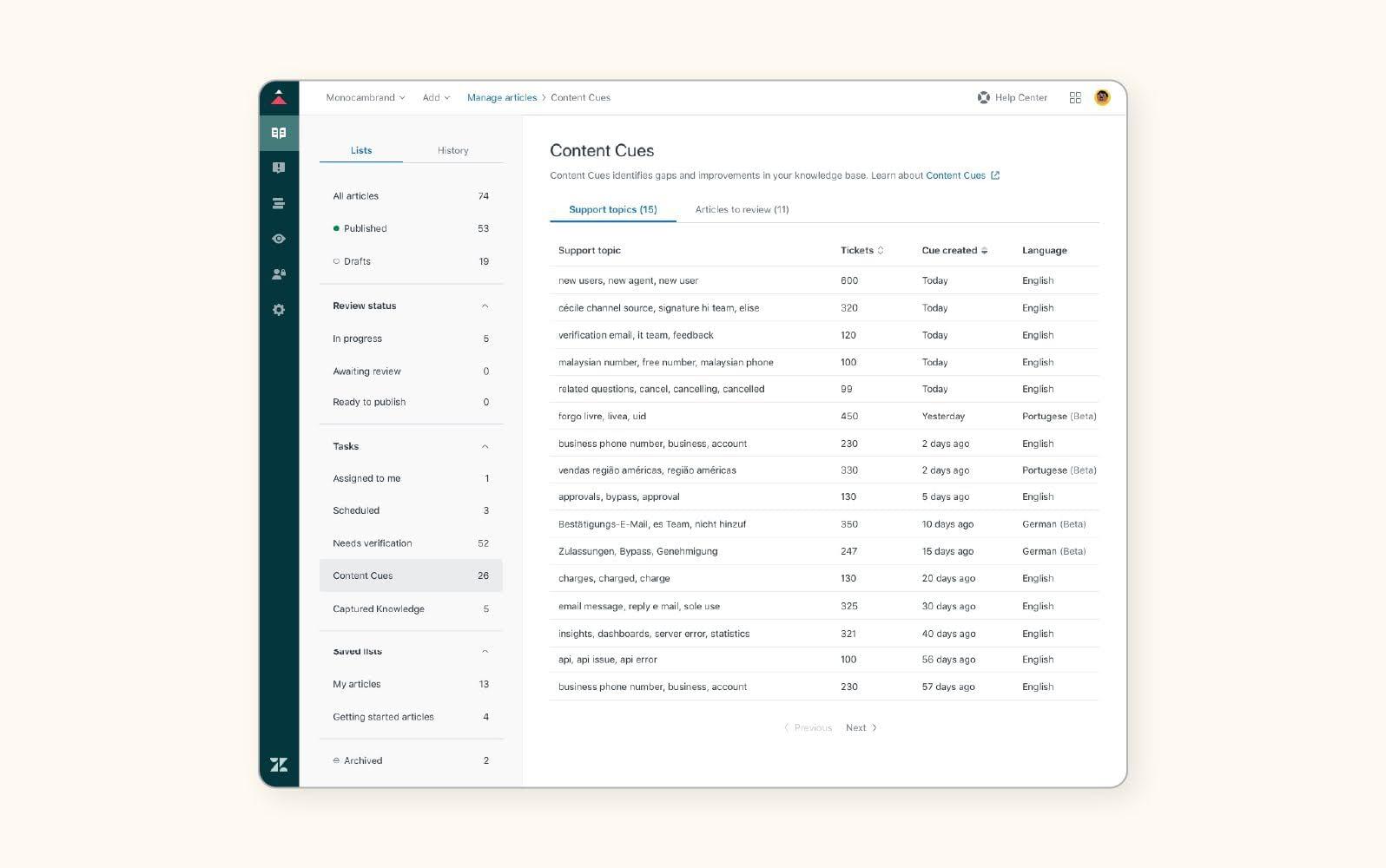
Zendesk offers knowledge base software as part of its customer service suite, which lets teams manage content, help tickets, internal communication, and more from a centralized place. Our software can be used internally as an IT knowledge base or agent knowledge base and as a customer-facing FAQ software tool.
Our knowledge base software helps you keep your content relevant. Built-in AI-powered tools like Content Cues provide insights into what customers are searching for, suggestions for new knowledge base content to fill knowledge gaps, and prompts to update content in existing articles. Generative AI features can write new articles, revise existing content, and create conversational responses during customer interactions.
Managing updates is easier with Team Publishing, a collaboration tool that allows your team to build workflows to review, approve, and publish content. With the Content Blocks feature, you can create and place content blocks—text, images, and videos—in relevant articles. These blocks get updated in a single place and automatically change anywhere the content appears.
Zendesk makes knowledge management systems accessible to everyone, too. You can create language-specific versions of your articles in over 40 languages. You can also build a self-service portal for your customers or employees, ensuring that information is always available whenever they need it.
Features:
Branding and customization
Roles and permissions
Team collaboration and editing
Publishing workflows
Multilingual support and content
Pricing:
Suite Team: $55 per agent/month
Suite Growth: $89 per agent/month
Suite Professional: $115 per agent/month
Suite Enterprise: Talk to sales
Suite Enterprise Plus: Talk to sales
*Plans are billed annually.
Free trial:
14 days
2. Helpjuice
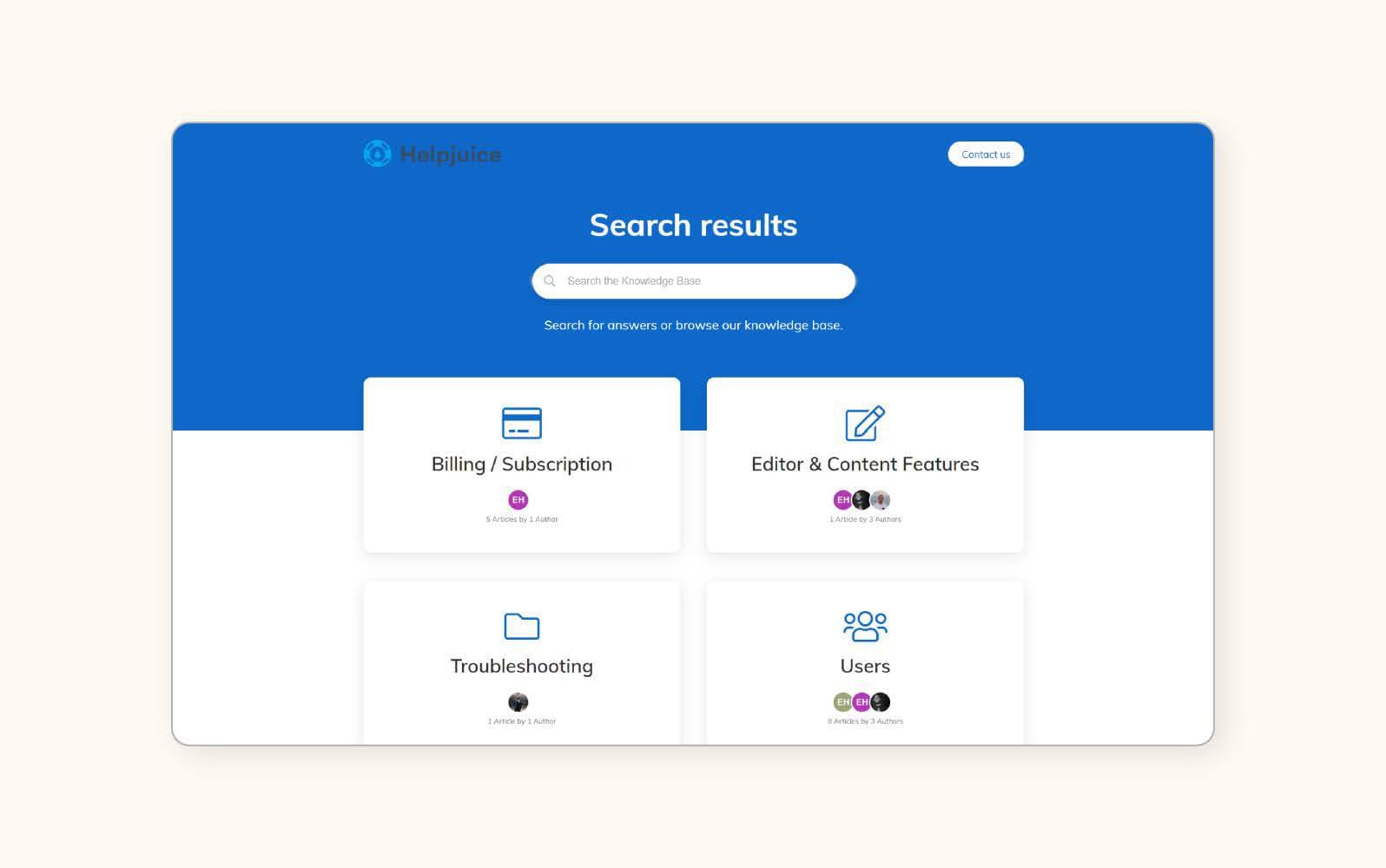
Helpjuice offers knowledge base software that can help businesses manage content. The solution features a search engine specifically designed for knowledge bases to help users quickly find what they need. Users can create articles using the native What You See Is What You Get (WYSIWYG) editor and publishing interface to immediately add content.
The platform employs AI-driven algorithms to recommend article topics and generate suggestions for content improvements. Analytics highlight which articles get the most views and which users search for them. Additionally, Helpjuice offers customization options. The customizable themes allow you to create a tailored brand experience, and multilingual support lets you switch languages from the authoring panel.
Features:
AI and generative AI tools
Branding and customization
Roles and permissions
Team collaboration and editing
Reporting and analytics
Automatic language translation
Pricing:
Starter: $120 per month (up to 4 users)
Run-Up: $200 per month (up to 16 users)
Premium Limited: $289 per month (up to 60 users)
Premium Unlimited: $499 per month
Free trial:
14 days
Learn more about the Helpjuice integration for Zendesk.
3. Bloomfire
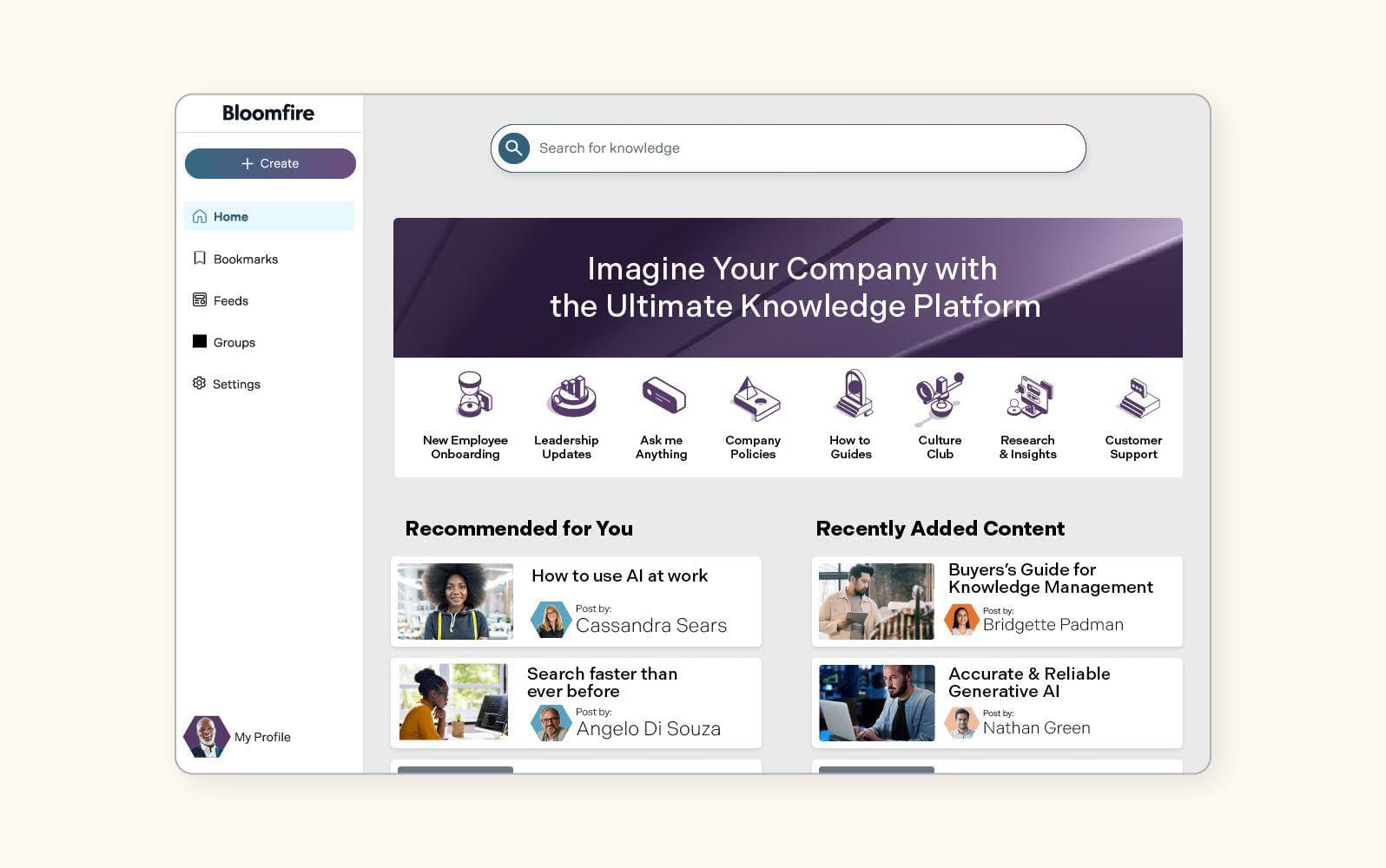
Bloomfire helps teams organize company knowledge in a centralized platform. The platform mimics social media with capabilities for users to engage with the content with likes, shares, comments, or follows. Plus, Bloomfire’s AI technology can understand the user's queries and provide intelligent suggestions.
The reporting features and feedback loops can help management teams understand if the content is engaging and helpful and if there are any opportunities for improvement. Moreover, Bloomfire's platform supports the creation of crowd-sourced FAQs so teams and communities can collaboratively build a repository of best practices.
Features:
AI and generative AI tools
Branding and customization
Roles and permissions
Team collaboration and editing
Reporting and analytics
Auto-tagging content
Pricing:
Talla: Starts at $460 per month (up to 50 users)
Starter: $1,750 per month (up to 100 users)
Flex: $25 per user/month (up to 500 users)
Enterprise: Contact Bloomfire (500+ users)
*Plans are billed annually.
Free trial:
30 days
Learn more about the Bloomfire integration for Zendesk.
4. Guru
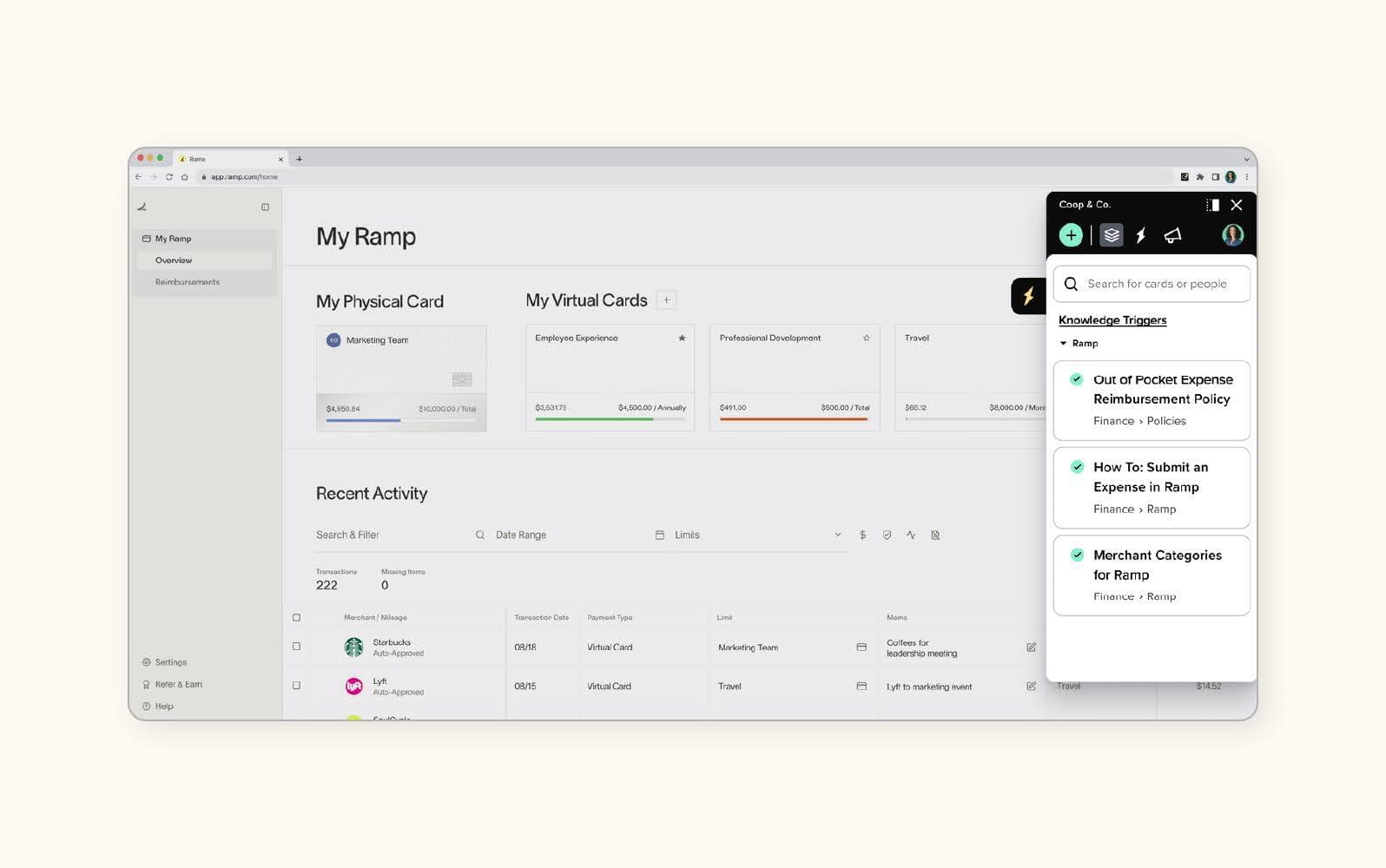
Guru’s knowledge base system enables teams to create, share, access, and update information. It fits within your team’s existing workflow by unifying contextually relevant information with existing tools like chat, email, and your customer relationship management (CRM) system.
Guru uses AI to surface information in the knowledge base, so suggestions improve over time based on customer and employee search patterns. The AI can also suggest related articles and flag redundant information to keep content fresh. Though Guru is an internal knowledge base, you can use its application programming interface (API) to publish content externally.
Features:
AI and generative AI tools
Branding and customization
Roles and permissions
Team collaboration and editing
Reporting and analytics
Team workspaces
Pricing:
Builder: $10 per user/month
Enterprise: Contact Guru
*Plans are billed annually.
Free trial:
30 days
Learn more about the Guru integration for Zendesk.
5. Zoho Desk
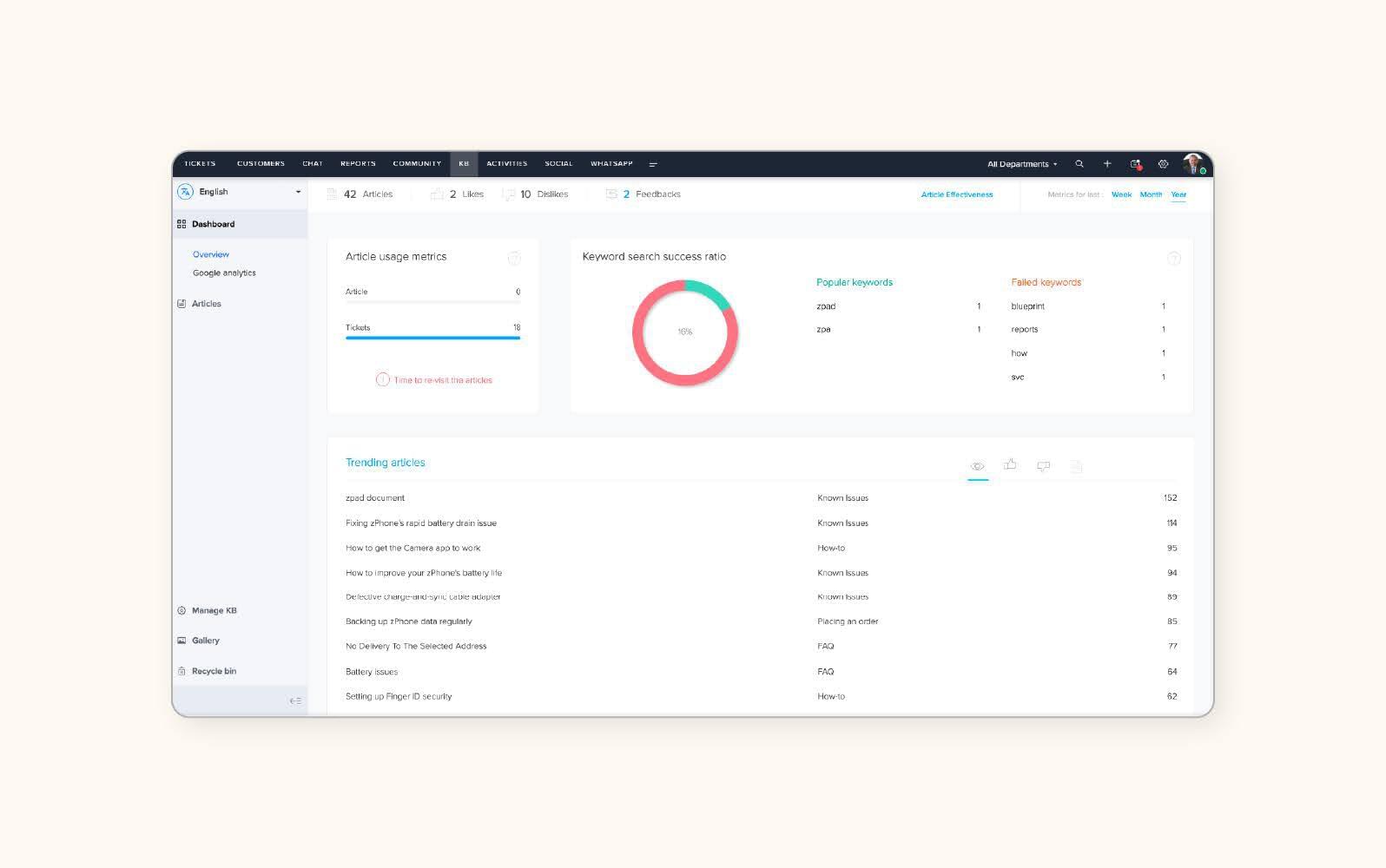
Mostly known for its ticketing system and help desk solutions, Zoho Desk also offers knowledge base software. The customizable structure allows you to form separate categories for how-to articles, FAQs, and other self-service options.
Writers and editors can work together to create content using Zoho’s collaboration tools. Businesses can control access to their knowledge base by requiring users to create accounts. Additionally, Zoho allows users to customize knowledge base themes and branding with logos and color schemes. There are also community forums that encourage customers to collaborate and interact with your team.
Features:
AI and generative AI tools
Branding and customization
Roles and permissions
Team collaboration and editing
Reporting and analytics
Community forum
Pricing:
Free: $0 per month (3 agents)
Express: $7 per user/month (5 agents)
Standard: $14 per user/month
Professional: $23 per user/month
Enterprise: $40 per user/month
*Plans are billed annually.
Free trial:
15 days
Learn more about the Zoho CRM integration for Zendesk.
6. Document360
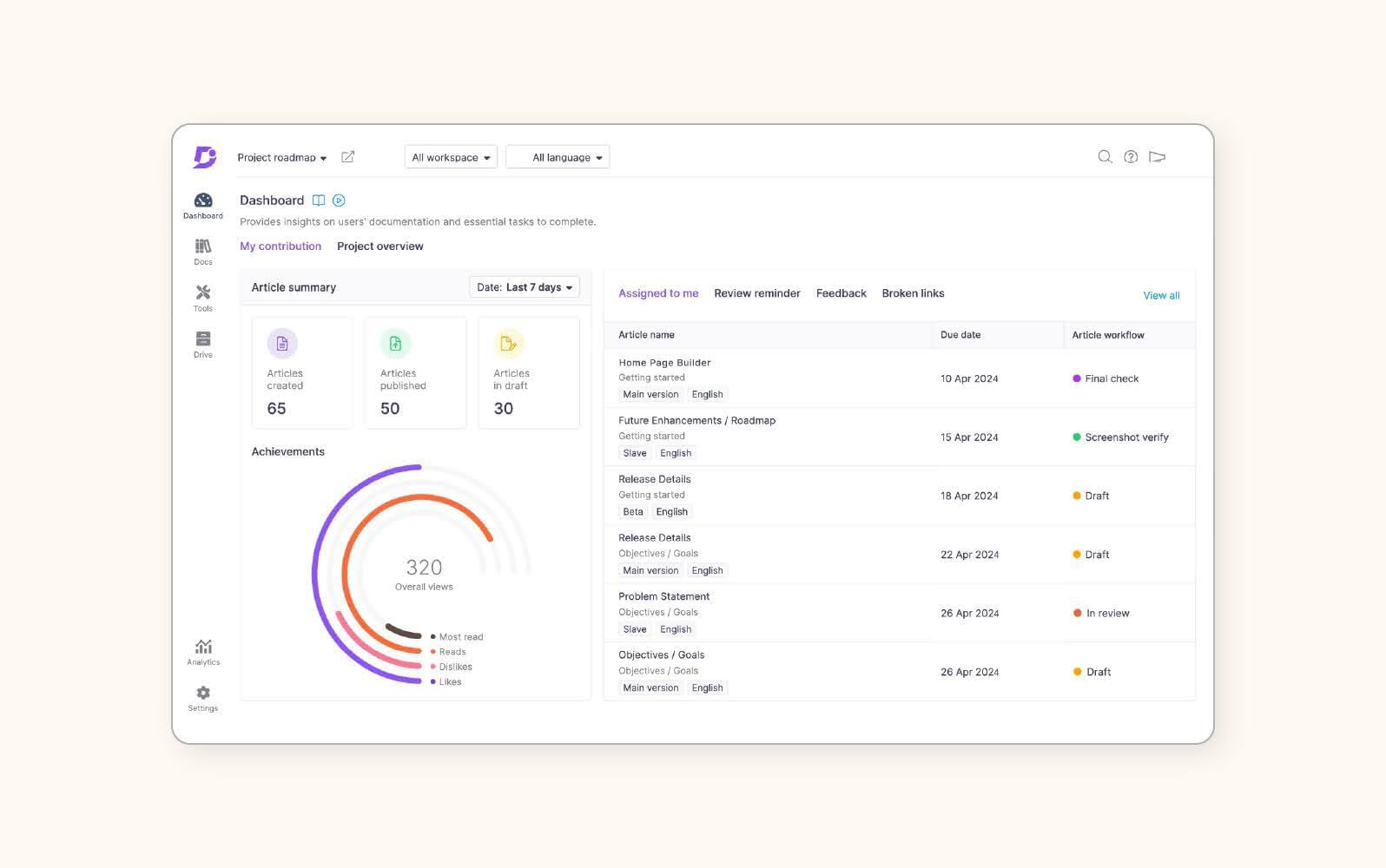
Document360 lets you create public knowledge bases for your customers and private knowledge bases for your team. Common features include real-time search, version control, content categorization, and a file manager. Plus, writers and editors can collaborate in discussion platforms while creating or reviewing drafts.
This knowledge base software includes markdown and WYSIWYG editors, so authors can create content using their preferred method. Document360 allows you to create how-to guides, tutorials, and technical documents for your teams. The software also offers article view permissions, which keep data private and secure by requiring a login to access information.
Features:
Branding and customization
Roles and permissions
Team collaboration and editing
Reporting and analytics
Page version control
Pricing:
Free: $0 per month (2 users)
Standard: $124 per project/month
Professional: $248 per project/month
Business: $331 per project/month
Enterprise: $497 per project/month
*Plans are billed annually.
Free trial:
14 days
Learn more about the Document360 integration for Zendesk.
7. Notion
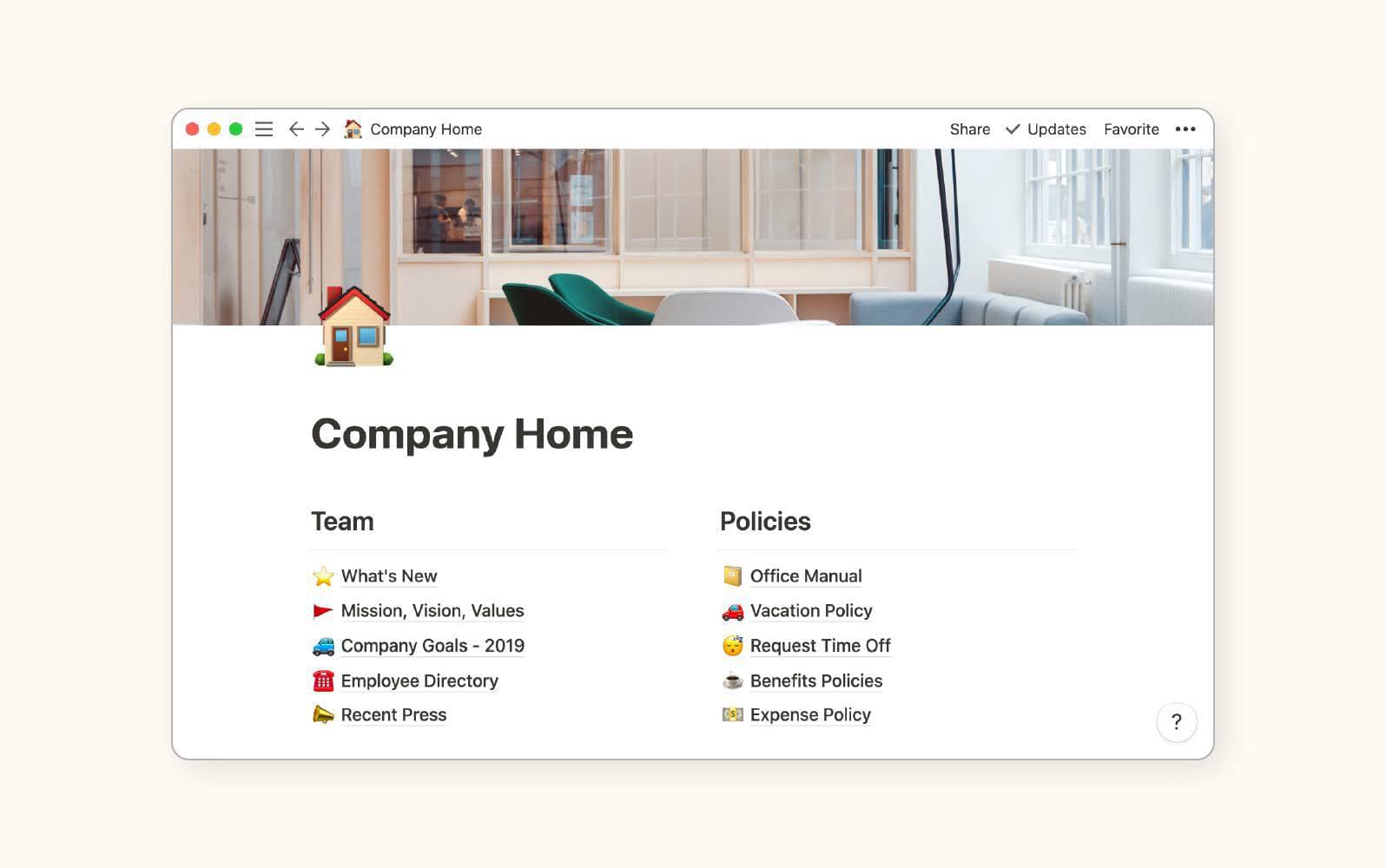
You can use Notion as a database, notepad, project management tool, and collaborative writing space. Its wiki software lets businesses organize knowledge in a searchable format, and permission settings can determine what users can access and do.
Notion lets you customize your customer knowledge base and organize content by adding tags, labels, and owners to your articles. It has thousands of pre-built templates and drag-and-drop tools to help build and structure pages quickly.
Features:
AI and generative AI tools
Branding and customization
Roles and permissions
Team collaboration and editing
Reporting and analytics
Pre-built templates
Pricing:
Free: $0 per month
Plus: $8 per user/month
Business: $15 per user/month
Enterprise: Contact Notion
*Plans are billed annually.
Free trial:
7 days
Learn more about the Notion integration for Zendesk.
8. HappyFox
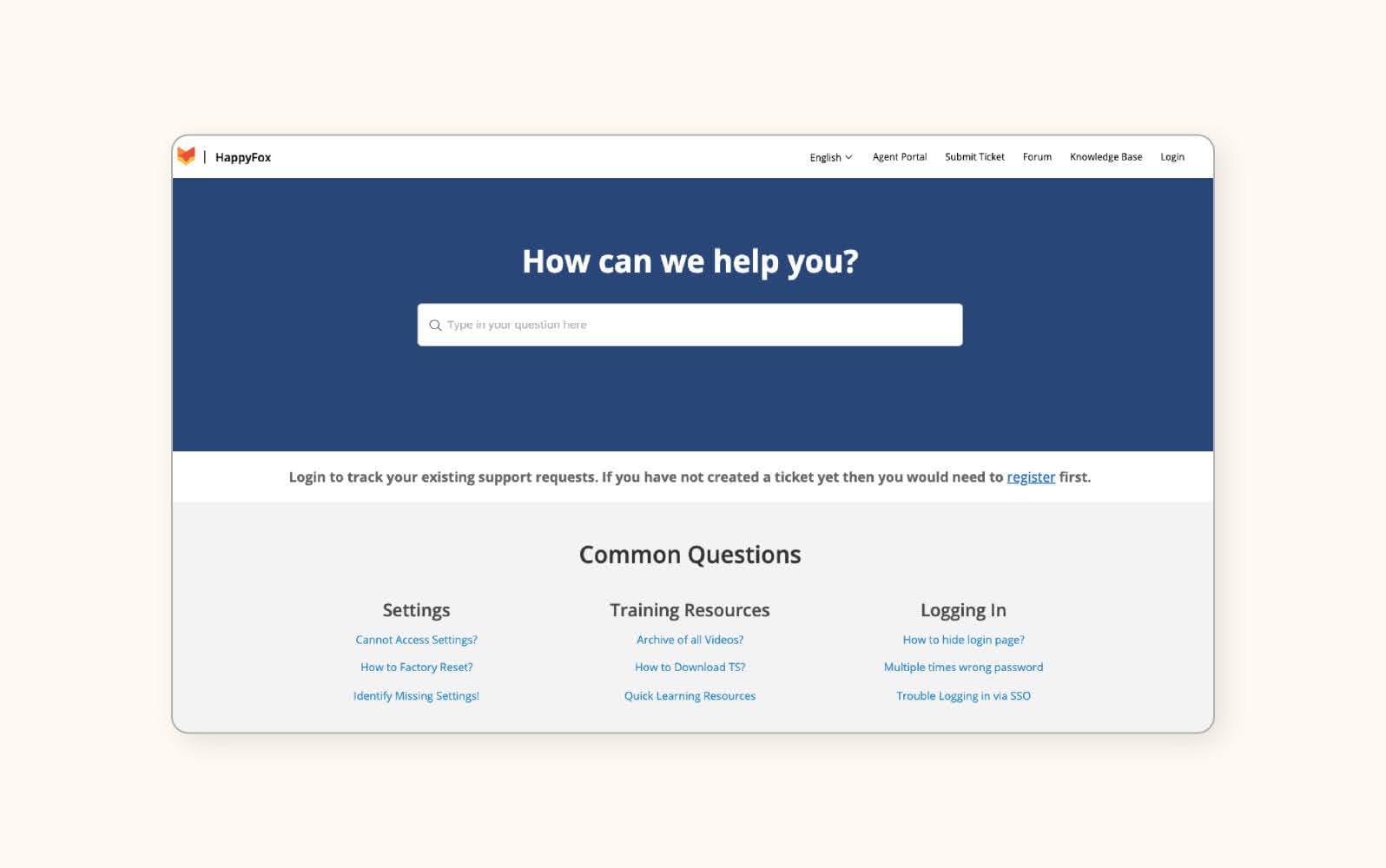
HappyFox provides help desk software with knowledge base solutions for businesses across various industries. Its knowledge base offers self-service options and makes it easy to collect customer feedback. The tool also has branded client portals and separate internal and external knowledge management systems.
HappyFox’s search engine shows top-ranking articles and FAQ pages, so users don’t need to hunt for them. The auto-suggest feature helps guide the customer through their self-service journey, while the structured index makes resources easier to find. HappyFox also makes it convenient to share content over social media channels.
Features:
Branding and customization
Roles and permissions
Team collaboration and editing
Reporting and analytics
SEO tools
Pricing:
Mighty: $29 per agent/month
Fantastic: $49 per agent/month
Enterprise: $69 per agent/month
Enterprise Plus: $89 per agent/month
*Plans are billed annually.
Free trial:
Unavailable
Learn more about the HappyFox Workflows integration for Zendesk.
9. Confluence
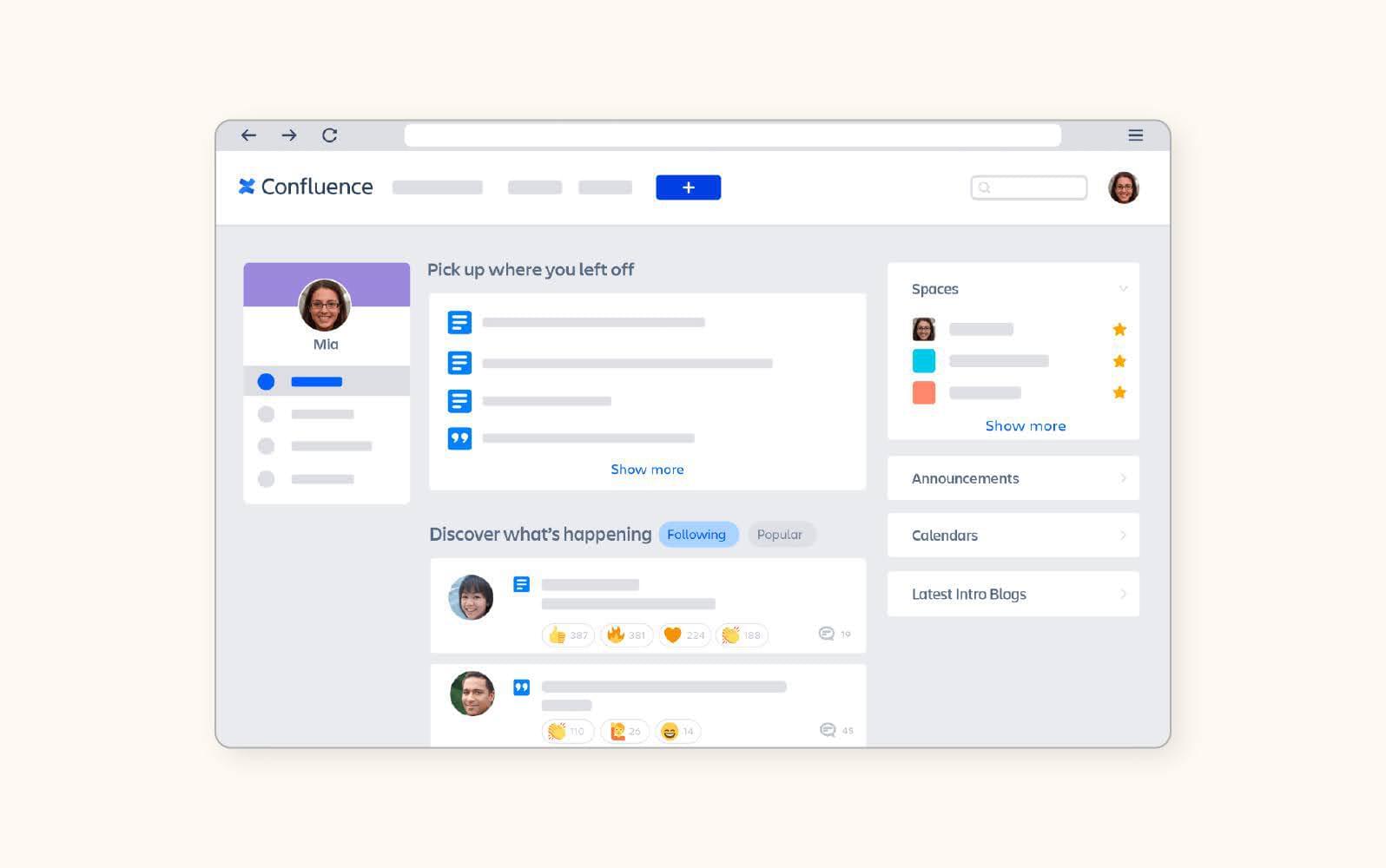
Confluence is a document collaboration and sharing platform by Atlassian that you can use for internal or external knowledge base purposes. The software can keep track of document changes for content auditing and lets teams collaborate on drafts.
The analytics tools in Confluence allow teams to track content performance, monitor user engagement, and identify areas that may require additional attention. Confluence also supports real-time co-authoring and editing of articles, as well as user comments and permissions management so teams can collaborate and maintain the accuracy of their knowledge base.
Features:
Roles and permissions
Team collaboration and editing
Reporting and analytics
Page history
Pre-built templates
Pricing:
Free: $0 per month (up to 10 users)
Standard: Starts at $600 per year
Premium: Starts at $1,150 per year
Enterprise: Contact Confluence
*Plans are billed annually and reflect pricing for up to 10 users.
Free trial:
7 days
Learn more about the Confluence integration for Zendesk.
10. HubSpot Service Hub
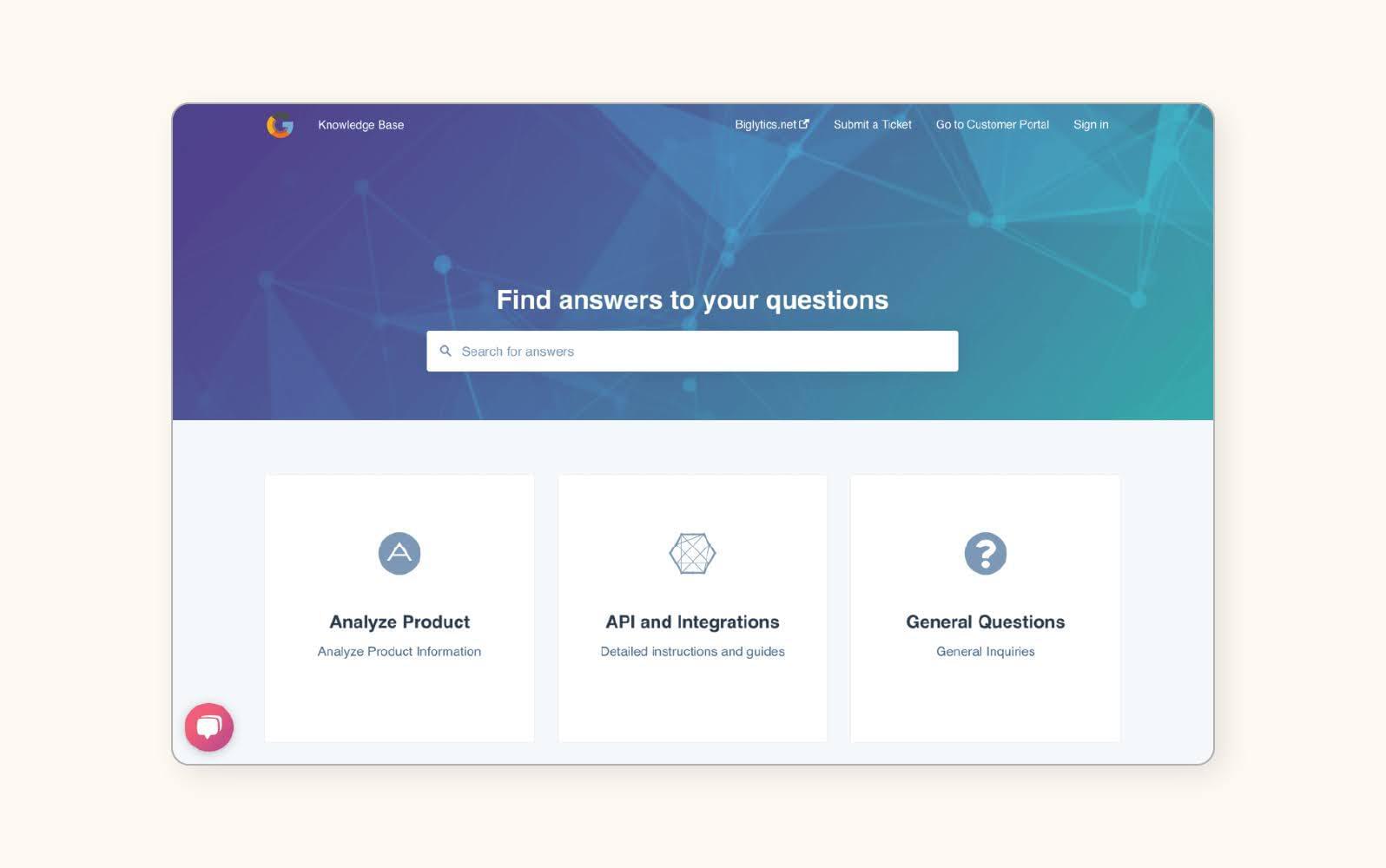
HubSpot Service Hub offers multiple features for knowledge management. The smart search functionality employs machine learning algorithms to understand and predict user queries before delivering relevant results. The knowledge base software supports custom branding, enabling organizations to tailor the appearance of their knowledge base—including color schemes, logos, and layouts—to match their brand identity.
HubSpot Service Hub also provides organizations with analytics that can share insights into how their knowledge base performs and how users engage with the content. Features such as permissions management and version control allow teams to collaborate.
Features:
AI and generative AI tools
Branding and customization
Roles and permissions
Team collaboration and editing
Reporting and analytics
SEO recommendations
Pricing:
Professional: Starts at $450 per month (5 users)
Enterprise: Starts at $1,200 per month (10 users)
*Plans are billed annually.
Free trial:
Unavailable
Learn more about the HubSpot integration for Zendesk.
11. Nuclino
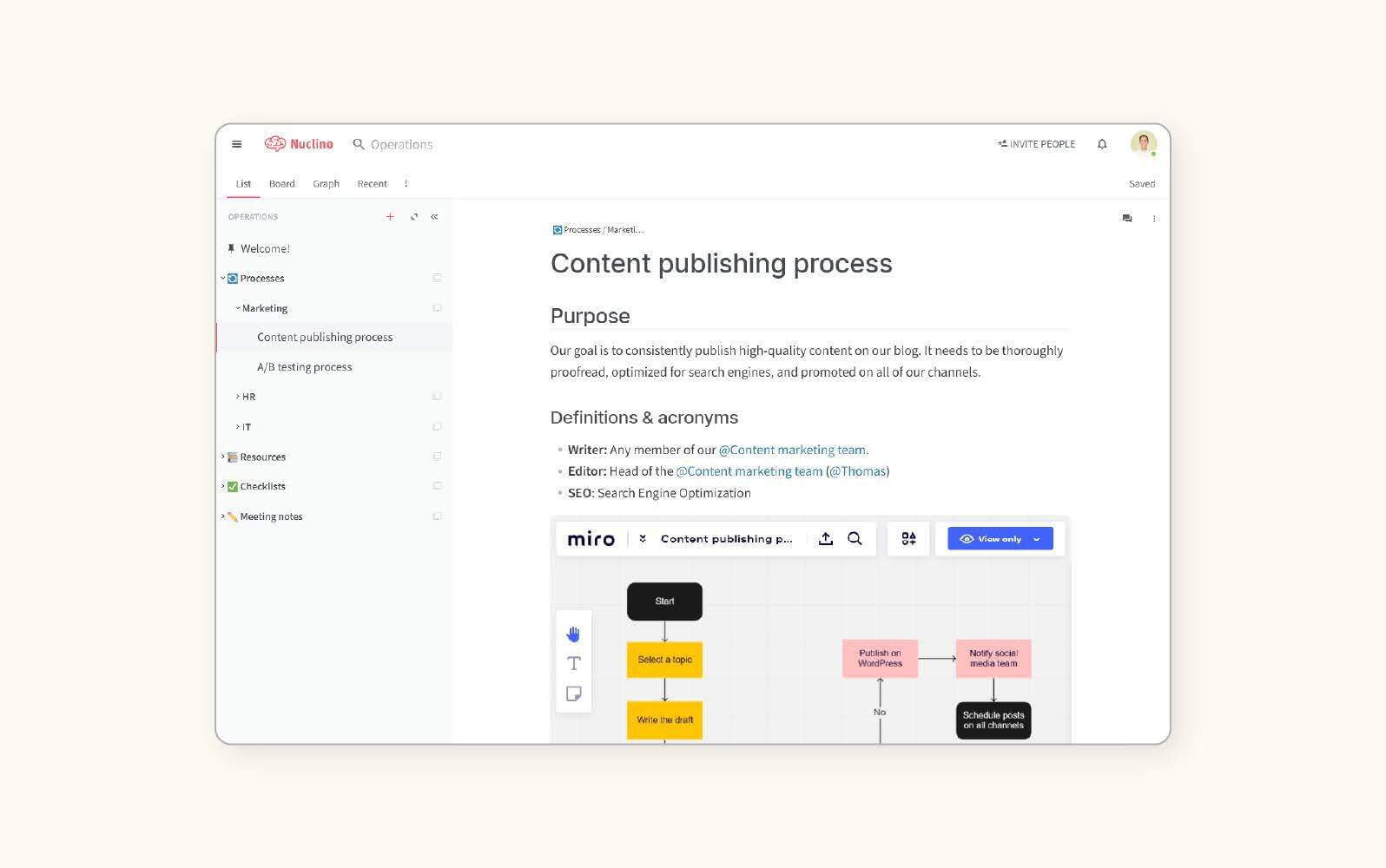
Nuclino’s knowledge base solutions offer AI that can assist users in creating structured, interconnected documents. The AI can generate ideas, write content based on provided keywords, and summarize notes.
With Nuclino, companies can set access restrictions to control who views, edits, and contributes content. Multiple users can work together, editing and commenting on documents in real time. The platform also includes an article version history tool, allowing users to track changes and revisions over time. Nuclino also provides a collection of templates that give users a starting point in designing wikis, product roadmaps, and handbooks.
Features:
AI and generative AI tools
Branding and customization
Roles and permissions
Team collaboration and editing
Content templates
Pricing:
Free: $0 per month (2GB of storage)
Standard: $5 per user/month
Premium: $10 per user/month
*Plans are billed annually.
Free trial:
14 days
12. ProProfs Knowledge Base
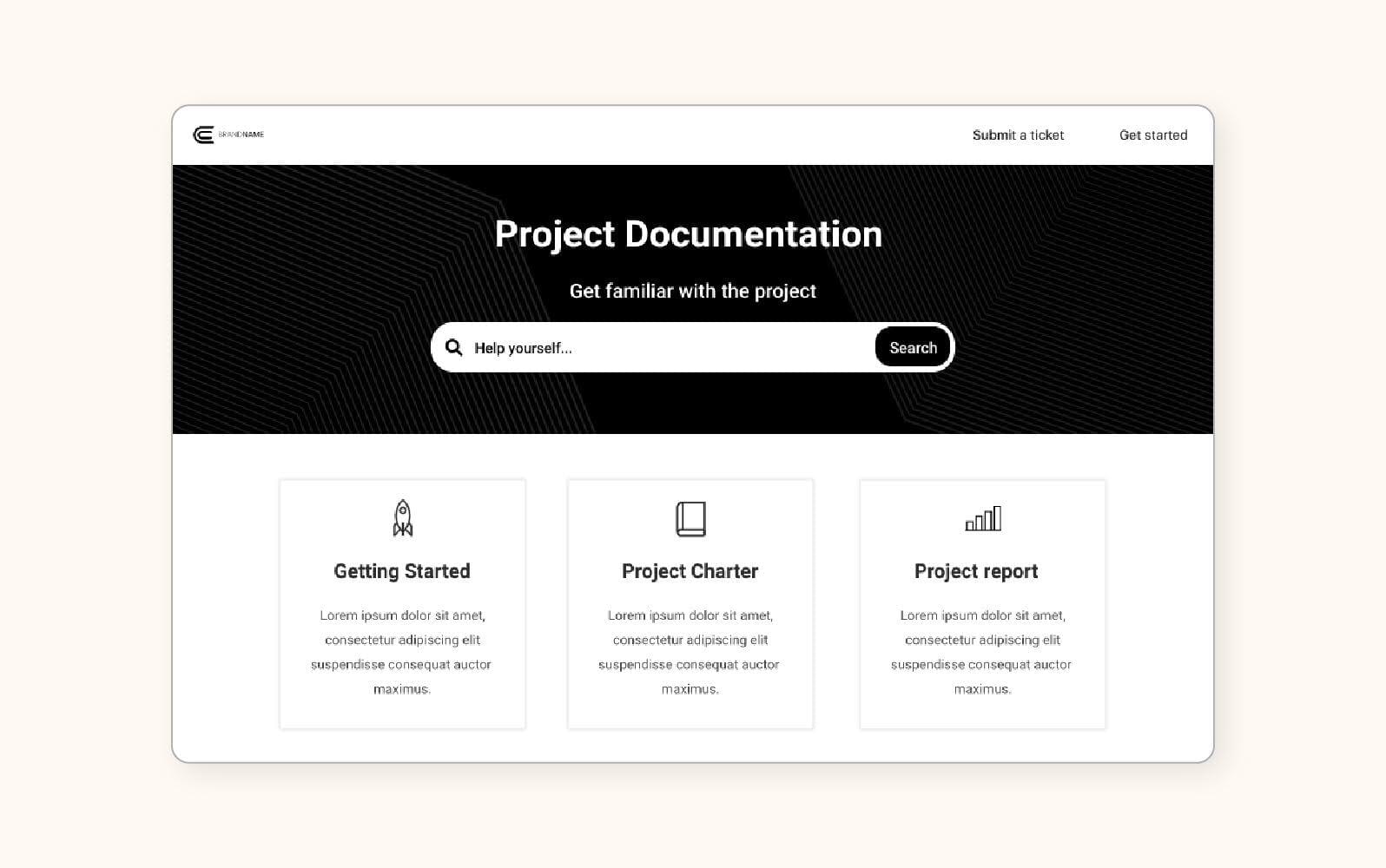
ProProfs Knowledge Base lets businesses view reports relating to article views, user interactions, and content performance to understand how readers are engaging with articles. And companies can define workflow processes so everyone knows how to create, review, and approve content.
ProProfs also lets users create conditional content, meaning it can hide or display content based on the reader’s viewing device or customer segment. Its WYSIWYG editor lets teams customize content templates and add images or videos.
Features:
Branding and customization
Roles and permissions
Team collaboration and editing
Reporting and analytics
Conditional content
Pricing:
Free: $0 per month (25 pages)
Business: $49 per author/month
*Plan is billed annually.
Free trial:
15 days
13. Help Scout
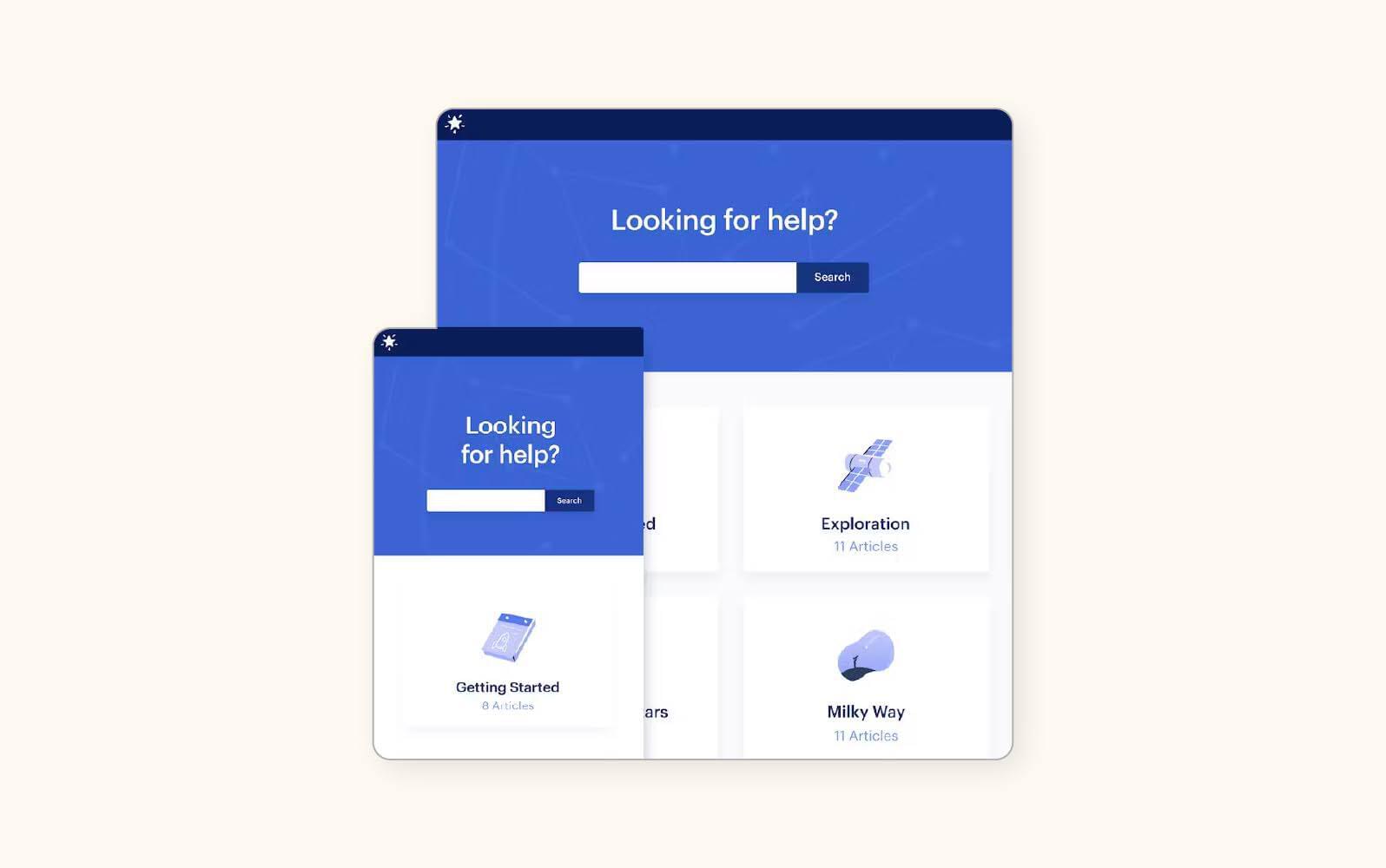
Help Scout provides knowledge base software as part of its help center solution. Businesses that use it can maintain a consistent look that aligns with their brand identity. Customization options include color schemes, logos, and layouts.
Businesses can control access and user permissions to protect sensitive information while still allowing collaboration and content management among teams. AI-powered tools can help users find what they need and provide recommendations for content creation. Additionally, its analytics can help teams track metrics like article views and search trends.
Features:
AI and generative AI tools
Branding and customization
Roles and permissions
Team collaboration and editing
Reporting and analytics
Collision detection
Pricing:
Standard: $20 per user/month
Plus: $40 per user/month
Pro: $65 per user/month
*Plans are billed annually.
Free trial:
15 days
14. Slite
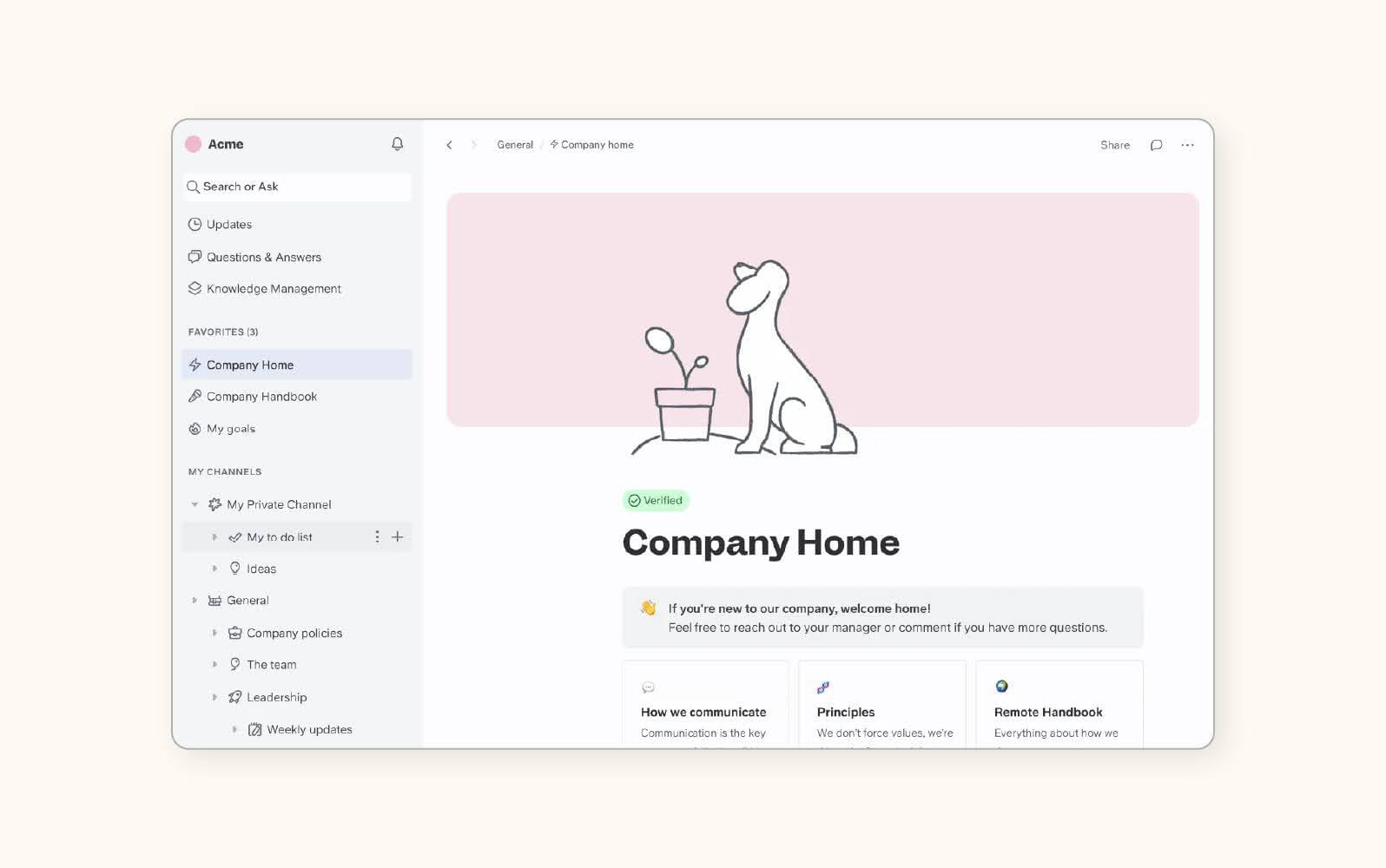
Slite is an internal knowledge management platform that houses team information. With a simple editor, a variety of templates, and flexible formatting, businesses can professionally organize content. Its search feature and document sorting make information simple to locate and access.
Slite includes document activity tracking so businesses can keep content up to date. Its AI can translate articles, summarize content, and change tone to appeal to different audiences. Teams can also collaborate and comment on documents in real time.
Features:
AI and generative AI tools
Branding and customization
Roles and permissions
Team collaboration and editing
Reporting and analytics
Version history
Pricing:
Free: $0 per month (50 docs)
Standard: $8 per member/month
Premium: $12.50 per member/month
Enterprise: Contact Slite
*Plans are billed annually.
Free trial:
Unavailable
What are different types of knowledge base tools?
For small businesses just starting out, a knowledge base might simply be a shared Google Drive with PDFs of product specs, customer FAQs, and employee manuals. But as the business grows, this can create issues with security, searchability, and accessibility. Here are the common types of knowledge base tools for businesses of any size.
Troubleshooting guides are step-by-step, easy-to-follow resources that help customers resolve common issues.
FAQ pages provide answers to the most common questions that customers ask.
Chatbots are AI-powered tools that provide proactive communication, 24/7 support, and self-service options.
Generative AI is a type of AI technology that can autonomously create original content, change the tone of existing articles, and revise outdated information.
Community forums are online portals where users engage in discussions, share information, ask questions, and collaborate.
Self-service portals are online platforms where users independently access information, find solutions to issues, and perform tasks without direct assistance.
Help centers are centralized online repositories where users can access organized and accessible information, documentation, and support resources.
How to choose the right knowledge base system
Knowledge base software is a tool used to collect, maintain, and provide the right information to the right person at the right time. Here are a few considerations when picking the best software for your business.
Make sure it’s secure
The best knowledge base software has safeguards in place to protect sensitive data. With up-to-date software compliance certifications, businesses demonstrate that they abide by industry restrictions and regulations to keep data secure. Your knowledge base software should also prioritize reliability and integrate with your problem management software. This allows the vendor to minimize downtime in case of an unpredictable system issue.
Vet how easy it is to set up and maintain
Pick software that deploys quickly and offers the tools you need for easy maintenance. It’s also wise to choose a vendor with a dedicated onboarding team to streamline the process, answer questions, and get you up and running swiftly. A fast time to value means you can start seeing the benefits of the software sooner rather than later.
Consider the total cost of ownership
Every business wants a quick return on investment (ROI) when investing in new software. The best way to achieve this is to choose reliable knowledge base software that is simple to set up, integrates with your current systems, and doesn’t require much training. This allows your team to use the software faster with minimal setup and training costs.
Note that free knowledge base software provides an affordable entry point to managing content, but you may quickly outgrow its basic features. When that happens, you might find the cost to upgrade and manage the system exceeds that of other paid services.
Benefits of knowledge base solutions
When you consolidate your institutional knowledge into a single database accessible from anywhere on the internet, you gain a major competitive advantage. Here are five top benefits that knowledge base systems provide.
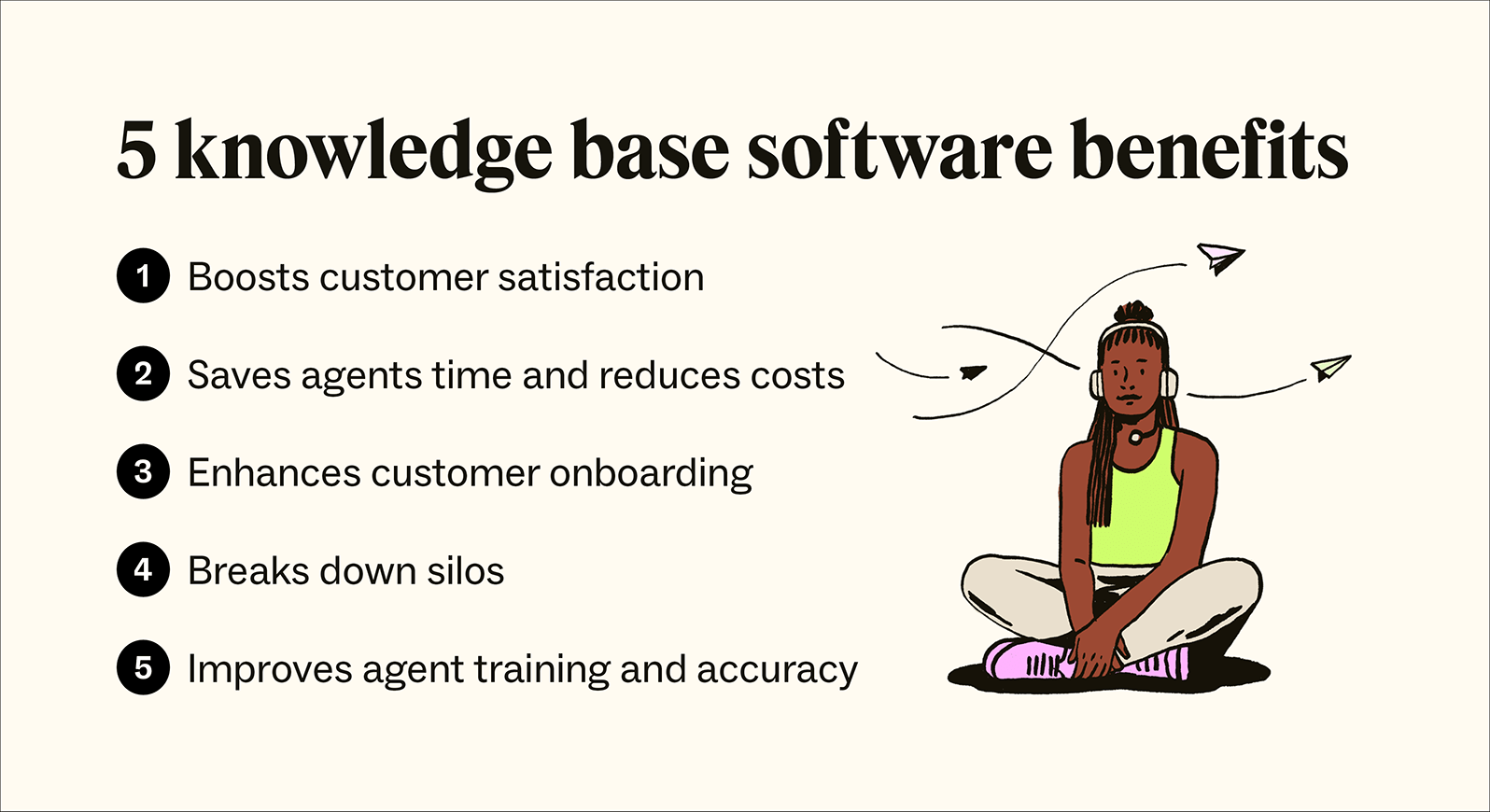
Boosts customer satisfaction
An external knowledge base never sleeps, so you can provide your customers with the information they want—when and where they want it. This enables your users to get 24/7 support from your company, even during holidays and off-hours. The customer doesn’t need to wait for an agent to help them fix an issue they can easily resolve on their own, creating a convenient experience that boosts customer satisfaction.
Saves agents time and reduces costs
Self-service resources can resolve basic issues without agent intervention, deflect tickets, and keep the queue manageable. This frees up agents to focus on solving more complex issues and providing great customer experiences. When integrated with chatbot software, knowledge bases can also be used to answer customer questions automatically, so you can avoid hiring more staff to handle higher ticket volumes.
Enhances customer onboarding and increases product adoption
Use your external knowledge base to create a seamless customer onboarding experience. When a new customer signs up, you can automate a welcome email that contains helpful resources from your knowledge base, such as:
Product tours and overviews
How-to videos and tutorials
Help center articles
Frequently asked questions
These onboarding materials deliver immediate value and encourage new customers to adopt your product faster.
Breaks down internal silos
Internal knowledge base tools can break down internal data silos by providing a centralized location for teams to access important information. When information lives across systems and departments, it’s difficult for employees to find what they need and deliver the high-quality, personalized experiences that customers expect. Knowledge base software allows teams to collaborate effectively by providing easy access to valuable and relevant information.
Improves employee training and accuracy
With information a single click away in your internal knowledge base, agents can efficiently and accurately help customers without having to memorize every detail. A knowledge base acts as a hard drive for your agents, allowing instant access to internal processes, FAQs, and articles for quick answers on demand. This also helps speed up agent onboarding and gives new hires access to training materials.
Features of knowledge base systems
A basic function of knowledge base software is to make it easy for support teams to create, manage, and share content with their customers. Here are a few essential features that the best knowledge base software should include.
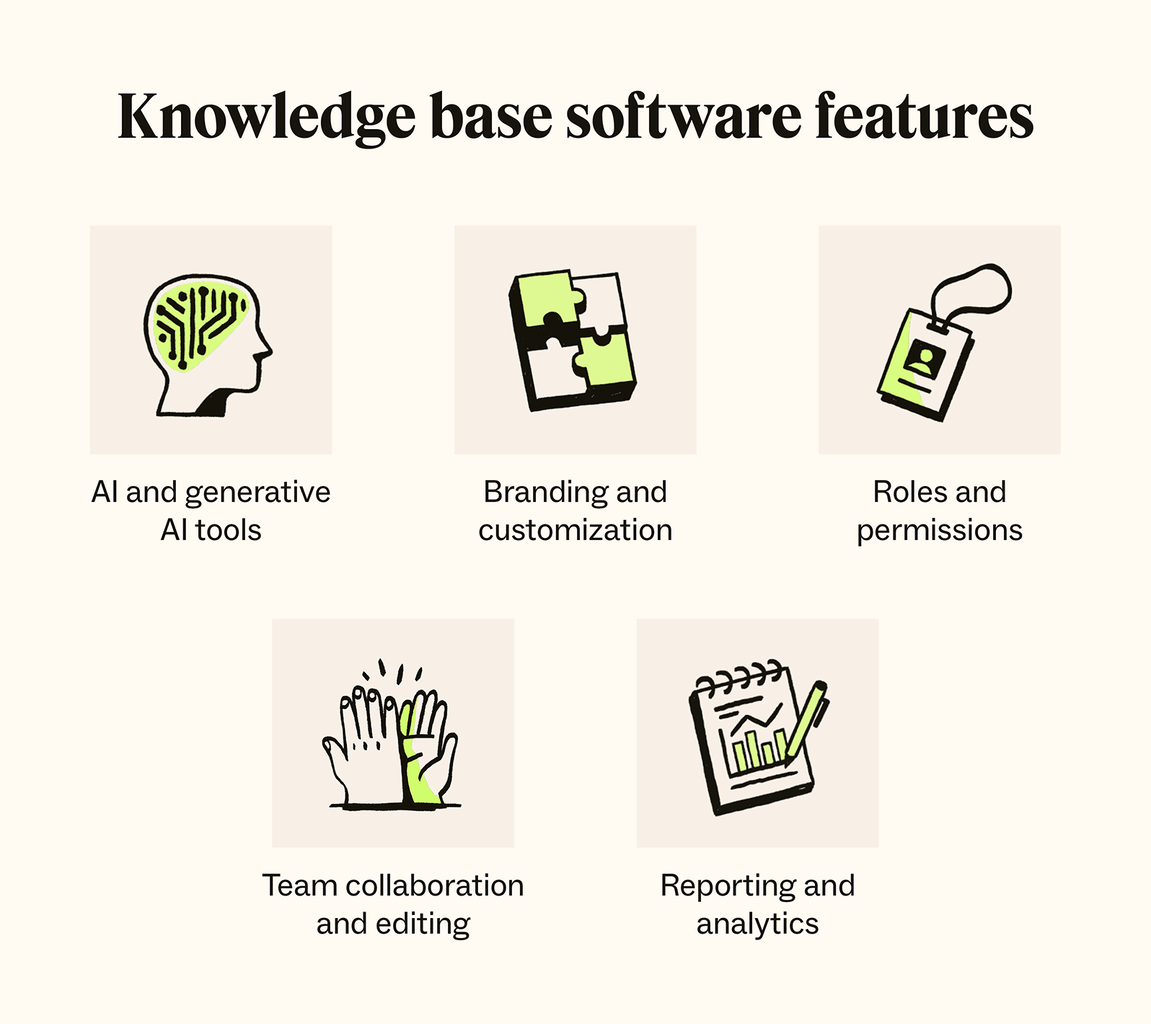
AI and generative AI tools
AI can play an important role in assisting with the creation and management of your knowledge base. AI-powered algorithms can recommend relevant topics, suggest content improvements, and even generate initial drafts of articles, significantly reducing the time and effort required to produce content. AI tools can help teams keep information up to date by identifying outdated or irrelevant content and suggesting updates.
AI-driven search and recommendation systems improve the discoverability of knowledge base content, helping users to easily find the information they need. At the same time, generative AI can assist in crafting clear and concise explanations. By automating these aspects of content creation and management, AI empowers teams to focus on higher-level tasks such as strategy, quality assurance, and enhancing the user experience.
Branding and customization
Your software should allow you to customize the appearance of your knowledge base with brand colors, fonts, images, and logos. Updating your theme to match each of the brands you manage—such as using the right colors and adding a logo to the header of your help center—enhances your readers’ experience. Some knowledge bases even let you upload a hero image for your home page and a banner image for your community pages and customize them with your chosen theme.
Roles and permissions
Controlling who can write, edit, and publish content is an important aspect of maintaining the integrity of your site. Likewise, authorizing who can view certain documents helps you protect sensitive information. For example, Zendesk provides four article view permissions for users: everyone, signed-in users, agents and admins, and custom user segments.
Team collaboration and editing/publishing workflows
Team collaboration and editing tools enable organizations to harness the collective intelligence of their teams and ensure that knowledge resources are continually improved and expanded upon. Collaborative editing allows multiple team members to contribute to, review, and refine knowledge base content in real time, leading to more accurate and comprehensive information.
These tools facilitate communication, alignment, and the pooling of diverse expertise, ensuring that the knowledge base reflects the latest insights and best practices. Version control features help maintain content quality and security by letting users see what’s changed and providing the option to recover previous drafts.
Reporting and analytics
The best knowledge base software does more than help your customers learn about your product or service. Reporting and analytics tools offer valuable insights into your knowledge base content, including:
The most- and least-viewed articles
The effectiveness of each article
The content gaps based on customer search and trending topics
With this information, you can consistently provide useful and enriching content for a great customer experience.
Frequently asked questions
Try knowledge base software for free
Your ability to empower customers and employees with a knowledge base will largely depend on the software you choose. With Zendesk, you can facilitate customer self-service and organize your institutional knowledge as a searchable database for your internal teams.
Zendesk knowledge base software also features generative AI tools to help your team streamline and scale knowledge management. Give Zendesk a try and start providing your customers with convenient self-service options while improving agent efficiency and resolution times.
